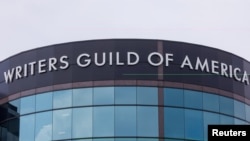Television and movie writers declared they are striking for the first time in 15 years, in a fight over fair pay in the streaming era.
The board of directors for the WGA voted unanimously to call for a strike, effective at the stroke of midnight. Writers, they said, are facing an “existential crisis.”
At issue is how writers are compensated in an industry where streaming has changed the rules of Hollywood economics. Writers say they aren’t being paid enough, TV writer rooms have shrunk too much and the old calculus for how residuals are paid out needs to be redrawn.
Streaming has exploded the number of series and films that are annually made, meaning more jobs for writers. But WGA members say they’re making much less money and working under more strained conditions.
Showrunners on streaming series receive just 46% of the pay that showrunners on broadcast series receive, the WGA claims. Content is booming, but pay is down.
“The companies’ behavior has created a gig economy inside a union workforce, and their immovable stance in this negotiation has betrayed a commitment to further devaluing the profession of writing,” the WGA said in a statement.
“From their refusal to guarantee any level of weekly employment in episodic television, to the creation of a ‘day rate’ in comedy variety, to their stonewalling on free work for screenwriters and on AI for all writers, they have closed the door on their labor force and opened the door to writing as an entirely freelance profession. No such deal could ever be contemplated by this membership.”
The Alliance of Motion Picture and Television Producers, the trade association that bargains on behalf of studios and production companies, said that it was prepared to improve its offer “but was unwilling to do so because of the magnitude of other proposals still on the table that the guild continues to insist upon."
The labor dispute could have a cascading effect on TV and film productions depending on how long the strike persists.
When Hollywood writers have gone on strike, it’s often been lengthy. In 1988, a WGA strike lasted 153 days. The last WGA strike went for 100 days, beginning in 2007 and ending in 2008.
The most immediate effect of the strike viewers are likely to notice will be on late-night shows and “Saturday Night Live.” All are expected to immediately go dark.
During the 2007 strike, late-night hosts eventually returned to the air and improvised material. Jay Leno wrote his own monologues, a move that angered union leadership.
Scripted series and films will take longer to be affected. But if a strike persisted through the summer, fall schedules could be upended. And in the meantime, not having writers available for rewrites can have a dramatic effect on quality.
The James Bond film “Quantum of Solace” was one of many films rushed into production during the 2007-2008 strike with what Daniel Craig called “the bare bones of a script.”
Overseas series could also fill some of the void. “If there is one, we have a large base of upcoming shows and films from around the world,” said Ted Sarandos, Netflix co-chief executive, on the company’s earnings call in April.







